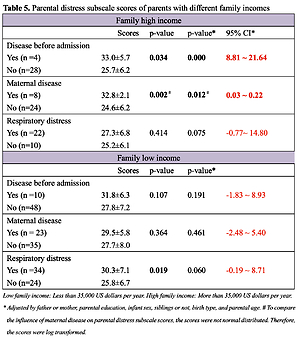Current issue
Archive
Manuscripts accepted
About the Journal
Editorial office
Editorial board
Section Editors
Abstracting and indexing
Subscription
Contact
Ethical standards and procedures
Most read articles
Instructions for authors
Article Processing Charge (APC)
Regulations of paying article processing charge (APC)
NEONATOLOGY / RESEARCH PAPER
Impact of Different Clinical Conditions of Preterm Infants on Parental Stress
1
School of nursing, Chung Shan Medical University, Taichung, Taiwan, Taiwan
2
Chung Shan Medical University Hospital, Taiwan
3
School of Medicine, Chung Shan Medical University, Taichung, Taiwan, Taiwan
Submission date: 2022-03-08
Final revision date: 2022-07-19
Acceptance date: 2022-07-25
Online publication date: 2022-08-11
KEYWORDS
TOPICS
ABSTRACT
Introduction:
Only a few studies report the impact of different clinical conditions of preterm infants on parental stress.
Material and methods:
Ninety parents of middle to late preterm infants filled out the parent distress subscale of the Parenting Stress Index-short form when their children were 1 month old. The scores were compared based on five clinical conditions of preterm infants: Condition 1: infants whose disease occurred before or during delivery; Condition 2: infants whose disease occurred after delivery; Condition 3: infants whose mother had a disease that might induce preterm birth or infant morbidity; Condition 4: infants with infectious disease; Condition 5: infants with respiratory distress. Parental distress scores in different demographic and clinical conditions was compared.
Results:
The stress of parents worsen when preterm infants had a disease occurred before and during delivery. In contrast, there was no impact when infant had a disease occurred after delivery. The stress of parents worsened when the preterm infants had respiratory distress. In contrast, there was no impact when infant had an infectious disease. When there was a maternal disease that may induce preterm birth or disease in infants, parental stress would worsen.
Conclusions:
The risk factors mentioned above increased parental stress as early as 1 month after delivery. Finding the risk factor as early as possible, and then performing a nursing intervention is crucial to decrease parents’ stress when they had preterm infants.
Only a few studies report the impact of different clinical conditions of preterm infants on parental stress.
Material and methods:
Ninety parents of middle to late preterm infants filled out the parent distress subscale of the Parenting Stress Index-short form when their children were 1 month old. The scores were compared based on five clinical conditions of preterm infants: Condition 1: infants whose disease occurred before or during delivery; Condition 2: infants whose disease occurred after delivery; Condition 3: infants whose mother had a disease that might induce preterm birth or infant morbidity; Condition 4: infants with infectious disease; Condition 5: infants with respiratory distress. Parental distress scores in different demographic and clinical conditions was compared.
Results:
The stress of parents worsen when preterm infants had a disease occurred before and during delivery. In contrast, there was no impact when infant had a disease occurred after delivery. The stress of parents worsened when the preterm infants had respiratory distress. In contrast, there was no impact when infant had an infectious disease. When there was a maternal disease that may induce preterm birth or disease in infants, parental stress would worsen.
Conclusions:
The risk factors mentioned above increased parental stress as early as 1 month after delivery. Finding the risk factor as early as possible, and then performing a nursing intervention is crucial to decrease parents’ stress when they had preterm infants.
We process personal data collected when visiting the website. The function of obtaining information about users and their behavior is carried out by voluntarily entered information in forms and saving cookies in end devices. Data, including cookies, are used to provide services, improve the user experience and to analyze the traffic in accordance with the Privacy policy. Data are also collected and processed by Google Analytics tool (more).
You can change cookies settings in your browser. Restricted use of cookies in the browser configuration may affect some functionalities of the website.
You can change cookies settings in your browser. Restricted use of cookies in the browser configuration may affect some functionalities of the website.



